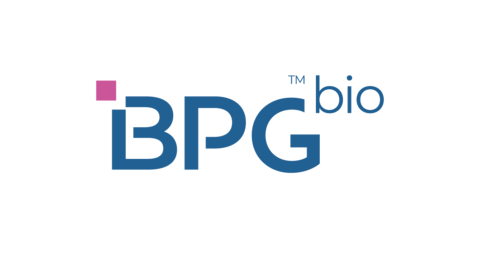BPGbio to Present Transformative Immuno-Oncology Research on BPM31510 and BRG399 at SITC 2024
BPGbio to Present Transformative Immuno-Oncology Research on BPM31510 and BRG399 at SITC 2024
- BPM31510 enhances anti-tumor responses through immune cell regulation in the tumor microenvironment and is being evaluated for efficacy in glioblastoma in a phase 2b study
- BRG399, a novel oral microtubule binding agent, enhances tumor cell ablation through immune modulation
- BRG399 achieves 100% tumor regression in a glioblastoma model, highlighting immune system involvement
BOSTON--(BUSINESS WIRE)--BPGbio, Inc., a leading biology-first, AI-powered clinical-stage biopharma company focused on mitochondrial biology and protein homeostasis, today announced that it will present three scientific posters at the Society for Immunotherapy of Cancer (SITC) 2024 Annual Meeting, taking place November 6-10, 2024, in Houston, Texas. The posters will highlight the latest research on the company’s drug candidates BPM31510 and BRG399 in the immuno-oncology space, providing further validation and paving the way for new potential therapeutic strategies in cancer treatment.
In the first study, titled “The Anti-tumor Response of BPM31510 is Associated with Immune Cell Regulation in the Tumor Microenvironment,” researchers showed that BPM31510 significantly increases reactive oxygen species (ROS) levels in cancer cells, leading to cell death across multiple cancer types. They also identified that, BPM31510 can boost the activity of cytotoxic tumor-infiltrating lymphocytes and reduce markers of T cell exhaustion. This dual action gives it the potential to be especially effective in treating "immunologically cold" tumors, such as glioblastoma and pancreatic cancer.
The second study, titled “BRG399, a Novel Oral Microtubule Binding Agent, Induces Tumor Regression and Immune Memory in an Orthotopic Glioblastoma Rat Model,” found that BRG399 treatment leads to glioblastoma tumor regression, with 100% survival in treated rats. BRG399 also induces an immune memory response, preventing the recurrence of tumors when surviving rats are re-challenged with glioma cancer cells.
The third study, titled, “BRG399, a Novel Oral Microtubule Binding Agent, Exhibits Immune-Modulatory Properties Enhancing Anti-Tumor Responses,” showed that BRG399 alters the immune cell composition within the tumor microenvironment and blood. BRG399 also reduced markers of T cell exhaustion, suggesting that it can reinvigorate immune responses against tumors. These findings suggest that BRG399 should be further investigated as a potential component of cancer therapy, particularly when combined with immunotherapies, as it can both kill cancer cells and enhance immune activity.
“These compounds – BPM31510 and BRG399 – push the boundaries of what's possible in cancer therapy, showing that we can not only attack the tumor but also empower the body's immune system to keep fighting long after the treatment ends,” said Stephane Gesta, Ph.D., VP, Discovery and Translational Biology at BPGbio. “As we advance BRG399 through preclinical trials and approach the completion of BPM31510's Phase 2b study, we will continue leveraging our NAi Interrogative Biology Platform to gain additional insight for exploring new therapeutic opportunities for other diseases.”
Poster Presentation Details:
-
The Anti-Tumor Response of BPM31510 Is Associated with Immune Cell Regulation in the Tumor Microenvironment
Date and Time: November 8, 2024, 1:00 p.m. CST
Location: Exhibit Halls A B, George R. Brown Convention Center, Houston, Texas
Presenter: Maria-Dorothea Nastke, Ph.D.
Abstract Number: 1312
-
BRG399, a Novel Oral Microtubule Binding Agent, Induces Tumor Regression and Immune Memory in an Orthotopic Glioblastoma Rat Model
Date and Time: November 9, 2024, 2:00 p.m. CST
Location: Exhibit Halls A B, George R. Brown Convention Center, Houston, Texas
Presenter: Maria-Dorothea Nastke, Ph.D.
Abstract Number: 1313
-
BRG399, a Novel Oral Microtubule-Binding Agent, Exhibits Immune-Modulatory Properties Enhancing Anti-Tumor Responses
Date and Time: November 9, 2024, 3:00 p.m. CST
Location: Exhibit Halls A B, George R. Brown Convention Center, Houston, Texas
Presenter: Kaila Bennett, Ph.D.
Abstract Number: 1284
About BPM31510
BPM31510 is BPGbio’s lead candidate in late-stage development for glioblastoma multiforme (GBM) and pancreatic cancer. The compound has demonstrated a tolerable safety profile and shown potential clinical benefit in both populations. The mechanism of action of BPM31510 was first validated by data from BPGbio’s NAi Interrogative Biology platform, which suggested that there is a hallmark shift in the tumor microenvironment (TME) induced by BPM31510 which modulates mitochondrial oxidative phosphorylation in highly aggressive tumors. BPGbio has received FDA's Rare Pediatric Disease Designation for BPM31510IV for primary CoQ10 deficiency and BPM31510T for Epidermolysis Bullosa (EB) .
About BRG399
BRG399 is a BPGbio-developed candidate being studied for its therapeutic potential as a treatment for solid and liquid tumor cancers as well as diseases associated with neutrophil-driven inflammation. This experimental drug, a first-in-class, anti-tubulin agent with broad-spectrum anti-cancer activity and favorable pharmacological properties including oral bioavailability for clinical testing. BRG399 is leading the new oncology drug pipeline for BPGbio among other drug candidates which uniquely target the colchicine binding pocket in tubulin.
About BPGbio
BPGbio is a leading biology-first AI-powered clinical stage biopharma focused on mitochondrial biology and protein homeostasis. The company has a deep pipeline of AI-developed therapeutics spanning oncology, rare disease and neurology, including several in late-stage clinical trials. BPGbio’s novel approach is underpinned by NAi, its proprietary Interrogative Biology Platform, protected by over 400 US and international patents; one of the world’s largest clinically annotated non-governmental biobanks with longitudinal samples; and exclusive access to the most powerful supercomputer in the world. With these tools, BPGbio is redefining how patient biology can be modeled using bespoke causal AI specifically designed for solving large-scale biology challenges. Headquartered in greater Boston, the company is at the forefront of a new era in medicine, combining biology, multi-modal data, and AI to transform the way we understand, diagnose, and treat diseases. For more information, visit www.bpgbio.com.
Contacts
Media Contact:
media@bpgbio.com
